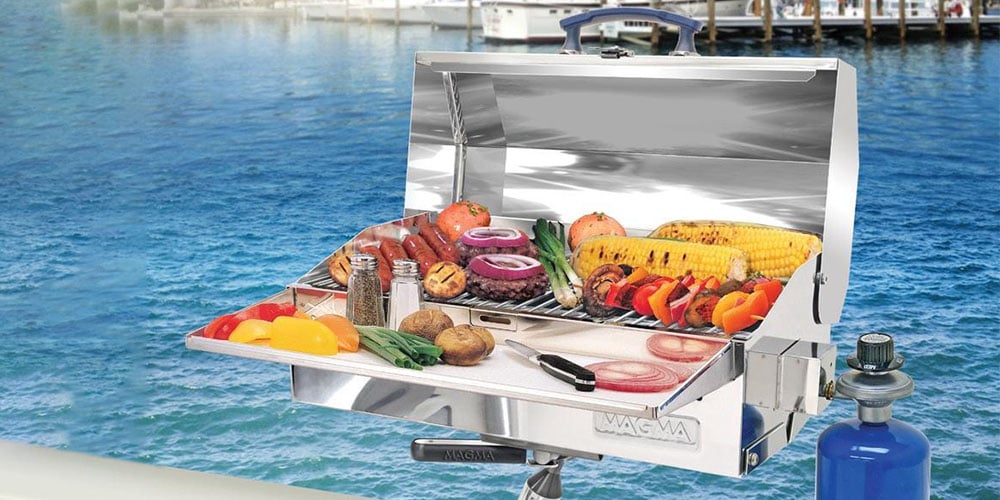How To Select A Marine Grill
Marine Barbecues: A Boater’s Essential Cooking Companion

Marine barbecues have become an indispensable feature for many cruisers and day-use boaters. There's nothing quite like anchoring in a tranquil cove and firing up the grill to cap off the day with a delicious meal. Additionally, they provide extra cooking capacity when the galley is overwhelmed with hungry guests. Mounted on the stern rail or gunwale, marine grills are always ready for action. Equipped with domes and lids, they offer energy efficiency, precise temperature control, and easy operation and cleaning.
Stainless Steel Design
High-end marine barbecues feature a double stainless-steel liner inside their shell, offering protection against discoloration and grease leaks. This design also keeps the exterior cooler to the touch and enhances durability. For saltwater environments, grills made of marine-grade stainless steel are recommended due to their resistance to corrosion, ensuring both longevity and a polished appearance. Magma offers a high quality line of stainless steel grills.
Factors to Consider When Choosing a Marine Grill
1. Choose Your Fuel: Propane or Charcoal
Marine grills typically run on either propane (or compressed natural gas) or charcoal.
- Charcoal Grills: Loved by purists for their flavor and the tactile joy of building a fire, charcoal grills bring a rustic charm to barbecuing.
- Gas Grills: A popular choice for their convenience, gas grills heat up quickly, distribute heat evenly, and offer precise temperature control with minimal effort. They’re also easy to clean and environmentally friendly, producing less carbon monoxide and soot.
Gas grills can connect to small propane canisters for portability or to a boat’s LPG/CNG system via an adapter. Features like push-button ignition using piezo-crystals make lighting the grill quick and reliable, even after a long, wet voyage.
2. Choose Your Form Factor: Round or Rectangular
Marine grills come in two shapes: round (kettle-style) and rectangular.
- Round Grills: Compact and unobtrusive, kettle-style grills like the Marine Kettle 2 are versatile, suitable for boiling, frying, simmering, and grilling.
- Rectangular Grills: These larger grills often include multiple burners, hinged lids, and secondary warming racks, making them ideal for cooking for a crowd.
3. Choose Your Size
The size of the grill depends on your cooking needs and available space. Options include:
- Round grills with 15" or 17" diameters (154-204 sq. in. cooking surface)
- Compact rectangular grills (~162 sq. in.)
- Large rectangular grills with up to 420 sq. in. of cooking area.
Heat Output: Gas grills’ heat is measured in British Thermal Units (Btu). Efficient grills maximize heat output while minimizing fuel consumption, critical when storing limited fuel on a boat.
4. Decide If You Want an Infrared Grill
Infrared (IR) grills use radiant heat for faster, even cooking and juicy results. Unlike traditional grills that rely on convection (hot air), IR grills sear food with direct heat, reducing cooking times and enhancing flavor.
5. Choose Your Mount
Grill mounts ensure safe and convenient positioning. Options include pushpit/rail mounts, rod-holder mounts, or deck sockets. For land use, consider a shore stand or a portable grill with folding legs, like the Cabo Grill.
6. Accessorize Your Grill
Accessories can enhance your grilling experience:
- Radiant burner plates or ceramic briquettes for even heat distribution
- Secondary fish grills for delicate items
- Serving shelves, grilling utensils, and drip box liners
- Protective Sunbrella covers to shield your grill from saltwater corrosion
Safe Barbecuing Tips
- Use moderate heat settings to avoid overcooking.
- Keep a spray bottle of water on hand to manage flare-ups.
- Always light the grill with the lid open.
- Ensure at least 2 feet of clearance from any combustible materials.
Maintaining Your Grill
- Exterior Cleaning: Wash with soapy water and a soft cloth after each use. Use a cover to protect against saltwater damage.
- Interior Cleaning: Remove grease buildup regularly and deep-clean annually.
- Grates: Coat with vegetable oil before cooking to prevent sticking, and clean with a brass wire brush while warm.
By selecting the right grill and following proper maintenance and safety practices, you can enjoy the joys of outdoor cooking while cruising the waters. A well-chosen marine barbecue not only enhances your dining experiences but also becomes a valuable companion on every adventure.
EXPLORE POPULAR ARTICLES
-
How to Choose the Right Propeller
Jan 1st 2025Selecting the right propeller is one of the easiest and most impactful steps to enhance your boat’s
-
Selecting and Installing Trim Tabs
Jan 1st 2025Explore the features and benefits of manual, electric, and hydraulic trim tabs, along with step-by-s
-
Navigation Light Requirements
Dec 30th 2024This article provides an overview of navigation light requirements and serves as a guide for selecti
